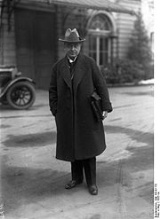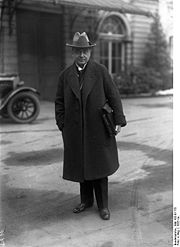
Karl Jarres
Encyclopedia

German People's Party
The German People's Party was a national liberal party in Weimar Germany and a successor to the National Liberal Party of the German Empire.-Ideology:...
(Deutsche Volkspartei, or DVP) during the Weimar Republic
Weimar Republic
The Weimar Republic is the name given by historians to the parliamentary republic established in 1919 in Germany to replace the imperial form of government...
. Jarres was born in the city of Remscheid
Remscheid
Remscheid is a city in North Rhine-Westphalia, Germany. It is, after Wuppertal and Solingen, the third largest municipality in Bergisches Land, being located on the northern edge of the region, on south side of the Ruhr area....
. Rhenish Prussia, and after legal studies in Bonn
University of Bonn
The University of Bonn is a public research university located in Bonn, Germany. Founded in its present form in 1818, as the linear successor of earlier academic institutions, the University of Bonn is today one of the leading universities in Germany. The University of Bonn offers a large number...
as a young adult, pursued an administrative career. He was mayor of his native Remscheid from 1910 until 1914 and was subsequently the mayor of Duisburg
Duisburg
- History :A legend recorded by Johannes Aventinus holds that Duisburg, was built by the eponymous Tuisto, mythical progenitor of Germans, ca. 2395 BC...
, located in the Ruhr
Ruhr
The Ruhr is a medium-size river in western Germany , a right tributary of the Rhine.-Description:The source of the Ruhr is near the town of Winterberg in the mountainous Sauerland region, at an elevation of approximately 2,200 feet...
region, from 1914 until 1933. During the Weimar period he served as Interior Minister and Vice Chancellor in the cabinets of Gustav Stresemann
Gustav Stresemann
was a German politician and statesman who served as Chancellor and Foreign Minister during the Weimar Republic. He was co-laureate of the Nobel Peace Prize in 1926.Stresemann's politics defy easy categorization...
and Wilhelm Marx
Wilhelm Marx
Wilhelm Marx was a German lawyer, Catholic politician and a member of the Centre Party. He was Chancellor of the German Reich twice, from 1923 to 1925 and again from 1926 to 1928, and also served briefly as minister president of Prussia in 1925, during the Weimar Republic.-Life:Born in Cologne to...
.
Jarres was the candidate of the DVP in the 1925 German Presidential election
German presidential election, 1925
The presidential election of 1925 was the first direct election to the office of President of the Reich , Germany's head of state during the 1919-1933 Weimar Republic. The first President, Friedrich Ebert, died on 28 February, 1925...
, the first direct election to the office of President of the Reich
Reichspräsident
The Reichspräsident was the German head of state under the Weimar constitution, which was officially in force from 1919 to 1945. In English he was usually simply referred to as the President of Germany...
(Reichspräsident). In the first round of the election he received the largest number of votes with over ten million and his plurality was at nearly 39%. The next major candidates were Otto Braun
Otto Braun
This article is about the Prime Minister of Prussia. For the German Communist and once the Comintern military adviser to the Chinese Communist revolution see Otto Braun ....
of the Social Democrats
Social Democratic Party of Germany
The Social Democratic Party of Germany is a social-democratic political party in Germany...
with nearly eight million votes (29%) and Wilhelm Marx
Wilhelm Marx
Wilhelm Marx was a German lawyer, Catholic politician and a member of the Centre Party. He was Chancellor of the German Reich twice, from 1923 to 1925 and again from 1926 to 1928, and also served briefly as minister president of Prussia in 1925, during the Weimar Republic.-Life:Born in Cologne to...
of the Catholic Center Party with nearly four million votes (14.5%). Jarres withdrew his candidacy in the second round of voting in favor of Paul von Hindenburg
Paul von Hindenburg
Paul Ludwig Hans Anton von Beneckendorff und von Hindenburg , known universally as Paul von Hindenburg was a Prussian-German field marshal, statesman, and politician, and served as the second President of Germany from 1925 to 1934....
who would go on to win the closely fought second round of elections against Marx and Ernst Thälmann
Ernst Thälmann
Ernst Thälmann was the leader of the Communist Party of Germany during much of the Weimar Republic. He was arrested by the Gestapo in 1933 and held in solitary confinement for eleven years, before being shot in Buchenwald on Adolf Hitler's orders in 1944...
, the candidate of the Communist Party of Germany
Communist Party of Germany
The Communist Party of Germany was a major political party in Germany between 1918 and 1933, and a minor party in West Germany in the postwar period until it was banned in 1956...
(KPD
Communist Party of Germany
The Communist Party of Germany was a major political party in Germany between 1918 and 1933, and a minor party in West Germany in the postwar period until it was banned in 1956...
).
Jarres was shunted out of public life with the rise the Nazi party in 1933 and spent the rest of his career in industry.

